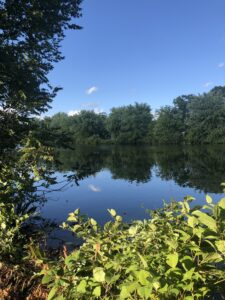My (Slow) Spiritual Start to Recovery
In my first two years of sobriety, I was generally white-knuckling life. I was trying to power through on my own without any faith, meetings, or therapy. I had interests in religion and spirituality throughout my youth and early 20s- often spending time at meditation classes, reading many spiritual books, or visiting Buddhist temples. However when it came to my early sobriety, I wasn’t using any spiritual practices in daily life to support my recovery.
As I began attending 12-step meetings, I quickly realized I wasn’t comfortable with the word ‘God.’ It felt overwhelming and was thrown around so much, plastered on every sign in the room. This triggered something deep inside that I hadn’t previously been aware of.
Although I wanted to leave from my first meeting and never look back, a group of women made efforts to connect with me. This helped me feel supported in ways I didn’t know I needed. It took a lot of patience and guidance from my first sponsor to start to feel open to a new experience with the concept of a higher power.
In hindsight, I realize that I was feeling closed off to ‘God’ at the time due to my own preconceived notions and personal judgement around having a catholic upbringing. I also had dealt with a significant and tragic death a few years prior which further disconnected me from feeling like a higher power was with me or had my back. I’ve since worked with many clients who have shared a similar experience- a disconnection from their prior religious beliefs or faith due to trauma and hardships through life.
All of this is to say that I did eventually come around to practicing the spiritual concepts laid out in 12 step meetings. Although I no longer regularly attend meetings, I am grateful for the principles I learned while in the program as they continue to stick with me as a part of my life today.
In this article I’ll review some strategies in exploring and adding spirituality into your life during early sobriety and recovery from addiction.

The Role of Spirituality in Early Recovery
Although there are alternatives- it is hard to completely avoid the subject of spirituality, faith, religion, or anything related to the topic of an energetic/ non-physical support when it comes to addiction recovery. Even if you’re going the fully independent or clinical route- you’re likely to be introduced to some level of 12 step support meeting while in an outpatient program or a recommendation from a therapist (or family member) to try out meetings and to get a sponsor.
Spirituality and the belief in something outside of you that you can lean on is often helpful in recovery for many reasons. Loneliness and hopelessness are often core experiences of those suffering with addictions, and a higher power relationship can help reinforce that you are not alone in that suffering.
Having faith and belief that someone is there with you and that you are cared about/ loved despite the choices you’ve made can make a difference from continuing on the same path of addiction vs. choosing a new life in recovery.
Defining Spirituality for You
Keep in mind that each person’s idea of spirituality, religion, faith, etc. may look very different. If you’re in a recovery setting- rehab, meetings, church groups- you’re likely to come across several different ideas for what a higher power and spiritual practices are to each individual.
Some higher power choices may be very traditional and some not so much. For example- at one of my first 12 step meetings I encountered a few individuals using G.O.D. as an acronym for ‘group of drunks.’ My assumed meaning of this is that their higher power is the group of alcoholics that come together in a recovery community to serve a greater meaning of helping each other and others. In this case, they are putting their faith in the fact that recovery is possible- and that the energy or spirit of the group is what they believe in.
As alternatives- I’ve worked with people in a therapy setting who have decided to choose a passed on loved one, a guardian angel, mother nature, and different Gods or Goddesses as their chosen higher power. There are also of course the more traditional routes of religions and incorporating the traditions, prayer, gatherings, and study of that chosen religion.
When choosing a route of higher power or faith- it doesn’t mean that you make one decision and it stays that way throughout your life. Often whatever you choose to try at first will change over time as you grow and develop in your understanding of yourself and what is helpful for you. You may find that you feel drawn to certain religions or belief systems from your past or to beleifs that are completely new to you.
Being open to a new experience and to new possibilities leaves the door open for you to grow and change as needed- to best support yourself in your continued recovery and in eventually helping others if you choose to.
Feeling Blocked & Hesitant Spiritually
If you are feeling blocked or hesitant spiritually in early recovery, you are not alone. My personal recommendation is to first practice some compassion and curiosity toward yourself around this block.
This can look like- “I’m noticing I feel against any idea of spirituality or a higher power in my life. I wonder why that is? It’s ok that I have these feelings. This is something I can sit with and choose to explore further (or not) when the time is right.”
As I described, feeling against ‘God’ was my experience until I felt connected to a group and resonated with what personal solutions and examples they were offering.
Many will feel abandoned by their early religious experiences, shame from their own addiction, or that they never felt connected before so why try again? It is common to feel jaded and avoidant in this way- especially when hurt by those closest to you, having experienced religious trauma in your childhood, and/or just never feeling that it made a positive difference or impact to you in the past.
I have some ideas, if you’re open to exploring, that may help shift some perspective and give empowerment back to your hands when it comes to choices in spirituality and religion.

Ideas for increasing Spirituality in Recovery
- Believe that they believe: consider believing that someone you trust believes. Reflect on how their belief and values have positively supported them. This belief (that your loved one or sponsor believes) can be a starting point or stepping stone for your own eventual connection to a higher power.
- Prayer or Mantra: choose one or two prayers/ mantras and stick to practicing only those at first. In the beginning I started with the 3rd step prayer (from the AA ‘big book’ Alcoholics Anonymous) and the serenity prayer at least once a day for building the habit of praying. Once you are comfortable with the habit of praying, see if you can start to feel any type of connection while in prayer.
Don’t be afraid to try to change some of the phrases to make the prayer feel more personal to you. You can also practice mindfulness of the words you are saying by slowing the prayer down and seeing if that helps with feeling a connection. I found it helpful at the time to even use just one line during stressful periods at work, “God, grant me the serenity,” and since I was personally uncomfortable with the word God I would often switch it out with the word ‘Creator.’
- Meditation: start small with meditation moments throughout the day. It can be the “mindful minute” of setting your timer for one minute and sitting quietly, breathing and listening to surrounding sounds. With meditation practices, especially when starting out, it is completely normal to be distracted. When distracted or ruminating in your thoughts, simply redirect your attention back to your breath, the feeling of your feet on the floor, or a focal point in the room.
Walking meditation in nature is another great beginner practice which can help with feeling connected to all that is- peace from the fresh air and sounds of nature, and a reset in your mindset for the day.
The purpose of practicing meditation is to slow things down and experience the moment- it is thought that in the stillness of the moment is when we can experience peace and truly connect spiritually.
- Grounding and Relaxation Techniques: some ideas for grounding exercises and relaxation techniques can include full deep belly breaths (3-5 breaths) with a slower exhale, square breathing (drawing a square and you breathe in-out-in-out), imagine your belly is a balloon and you are filling the balloon as you inhale deeply, then slowly exhaling as the air fizzles out of the balloon.
Grounding Techniques, similar to meditation, are for bringing your focus to the present moment and training yourself to have a choice in accessing peace/ centeredness rather than staying with discomfort and overwhelm. Spiritually, this can help us overtime to connect to our intuition, to calm our thoughts, and to be able to connect more easily with our higher power for support.
- Curiosity: practicing curiosity is a superpower when it comes to recovery and spirituality. A lot of us who struggle with addictions have grown up with limiting beliefs and experience black and white thinking. This can show up as rejecting new ideas, experiencing a lot of judgement thoughts about ourselves and others, and generally struggling with closeminded-ness when it comes to new perspectives.
Spiritually, fostering a curious mind can help with contemplating new ideas for what gives life purpose, experiencing increased connection to ourselves and others, and a desire to genuinely understand a deeper meaning in life
Conclusion
I’ve found personally that with time, spirituality can become a helpful foundation in the ups and downs of addiction recovery.
You’re not alone if you, like myself, find that it’s difficult at first to open up to the idea of spirituality in early recovery.
Some tips for starting to connect with spirituality can include prayer, meditation, grounding techniques, and practicing curiosity to keep an open mind.
If you’re feeling overwhelmed, remember it’s a process- unique for each individual- and we can all only make small changes one day at a time.
I appreciate you being here. If you’ve found anything helpful today please consider following me on social media linked below and joining my mailing list to stay in the loop. Thank you for reading!


